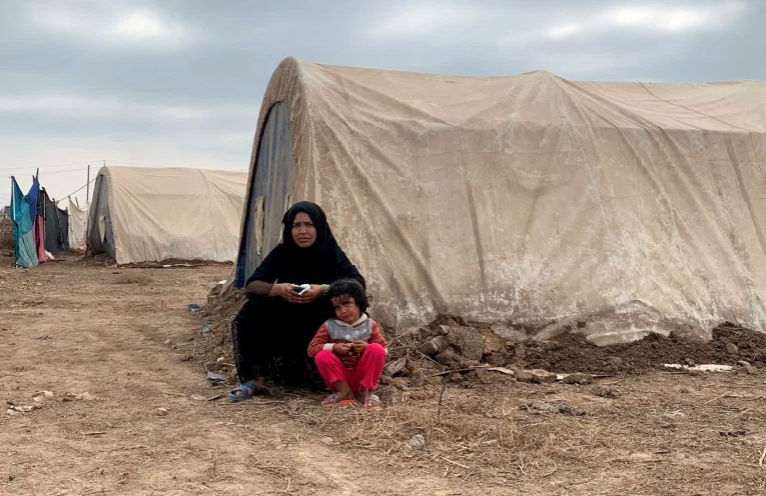Thousands of internally displaced people (IDPs) in Iraq are worried they will be forced to leave their camp in the northern Nineveh province, which hosts nearly 2,400 families, rights groups and refugees have told Al Jazeera.
Tens of thousands of Iraqis took shelter in refugee camps in Nineveh province, forced from their homes by the war against the ISIL (ISIS) armed group. ISIL was defeated in 2017 nearly three years after it took over large swaths of Iraq and neighbouring Syria.
Most of the camps in the province have since been shut down but Jedaa Camp, about 65 kilometres (40 miles) south of Mosul city, still hosts refugees who are afraid to go back to their homes because of the security situation.
“I have four children and my mother-in-law with me in the tent. My husband died in a mortar attack three years ago,” she said, adding that she has nowhere to go.
Activists and aid groups on the ground, who wished to remain anonymous, said on Monday that the Ministry of Displacement and Migration had instructed the camp mukhtars – men who often serve as heads of their communities – to inform all families from Tal Abta, al-Mahalabiya and al-Jaban districts to depart immediately.
The Iraqi government decided to close IDP camps last October and has since been pressuring IDPs to return to their homes in other parts of Iraq. But aid groups say those areas lack basic infrastructure and the homes refugees fled have still not been rebuilt since the territorial defeat of ISIL in 2017.
In November, humanitarian agencies raised concerns about the government’s decision. Refugees are also afraid that their old neighbours might assume that they are associated with ISIL and kill them for that.
Security concernsBut authorities seem to have ignored the refugees’ concerns.
A woman from Jedaa Camp said she and her family were forced to leave the and were heading to Mosul now.
“We have been forced to leave by police. We have nothing back in our village in Qausaja in al-Qayyarah town. They have told us we have to leave even if we end up on streets,” Shukria Khalaf Salih Tarfa told Al Jazeera.
Aid groups and international agencies have warned that the shutdown of the camp could leave hundreds without food and shelter in the middle of the coronavirus pandemic and harsh winter.
In a tweet on Thursday, EU Ambassador to Iraq Martin Huth expressed his concerns regarding the closure of the Jedaa dah Camp calling for a “voluntary, organised, and dignified return” of the IDPs.
“Deeply troubled by reports of ongoing and uncoordinated closure of Al-Jed’a IDP camp by Iraqi authorities that will likely result in more secondary displacement,” he said.
“EU supports voluntary, organised and dignified return allowing IDPs to reintegrate in a safe and sustainable way.”
Government denies forced evictionBut the ministry of immigration and displacement denies refugees are being forced out of the camp.
“We have an order to close Jedaa Camp 5, but it will be not be done forcefully if their places of origin are not safe for them to go back, we won’t send them back,” Ali Abass Jangir, spokesperson for the ministry, told Al Jazeera.
Rights groups have warned that refugees who go back home risk reprisals from some of ISIL’s victims and will be deprived of basic rights and at risk of becoming a permanent underclass.
“The Iraqi authorities and KRG [Kurdish Regional Government] must address the continuing collective punishment of IDPs with perceived links to IS [ISIL] as an integral part of any national plans to close camps – currently the only option for shelter for thousands of people,” Lynn Maalouf, Amnesty International’s deputy regional director for the Middle East and North Africa, said in a statement in November.
“Tackling these injustices is the only way to ensure a safe and dignified return, otherwise they risk perpetuating the sorts of actions that sow the seeds for future cycles of violence.”
In December, the UN said it was “gravely concerned about the thousands of civilians who have been moved from camps of IDPs in the last six weeks and have not yet found new homes.”
The Iraqi government has closed or consolidated 11 IDP camps and reclassified two as informal sites since October, affecting more than 27,000 people, according to the UN.
About 1.3 million people remain internally displaced across Iraq, including Nineveh, from 6 million at the height of the sectarian conflict.
Meanwhile, at the camp, the sense of fear is palpable.
“Police have been telling us if we don’t leave the camps, they will set it on fire,” Samir Mahmood Abdu-AlJabar, 35, told Al Jazeera from the Jedaa Camp.
“I told them you can kill me here as I know I won’t survive outside of the camp.”
Source (Click Here)


 RSS Feed
RSS Feed